Illinois Baptist


Millennials are bringing it
Table Talk with Andrew Woodrow P. 9



Table Talk with Andrew Woodrow P. 9
evangelism

Baptists mobilize for year-long emphasis
Raleigh-Durham, N.C. | Southern Baptist Convention President J.D. Greear is encouraging Southern Baptists to answer a simple question in 2019: Who’s your one?



The question is at the center of an evangelism and prayer emphasis Greear introduced last year to his own congregation, Summit Church in Raleigh-Durham.
“We asked each member of our congregation to identify one person they could pray for and seek to bring to Christ over the year,” Greear wrote in SBC Life. “The phrase we kept repeating was, ‘Who’s your one?’”
NATE ADAMS
The survey says…




What churches need now
P. 2
GENDER IDENTITY Church and State in conflict

A roundup of stories
P. 4
2018 SUMMARY Cooperative Program Missions giving at work Section B
representatives
Other faiths:
Orthodox Christian – Congress 0.9% | U.S. less than 1%
Muslim – Congress 0.6% | U.S. 1%
Hindu – Congress 0.6% | U.S. 1%
Buddhist – Congress 0.4% | U.S. 1%
Unitarian Universalist – Congress 0.4% | U.S. less than 1%
Other faiths – Congress 0% | U.S. 2%
Religious views of the newly seated U.S. Congress, compared to the nation: – Pew Forum, Jan 2019
the cooperative program
Giving by IBSA churches as of 1/11/19
$272,248
Budget Goal: $119,231
Received to date in 2018: $38,242
2018 Goal: $6.3 Million
Editor - Eric Reed
Managing Editor - Meredith Flynn
Graphic Designer - Kris Kell
Contributing Editor - Lisa Misner
Multimedia Journalist - Andrew Woodrow
Administrative Assistant - Leah Honnen
The general telephone number for IBSA is (217) 786-2600. For questions about subscriptions, articles, or upcoming events, contact the Illinois Baptist at (217) 391-3119 or IllinoisBaptist@IBSA.org

The Illinois Baptist is seeking news from IBSA churches. E-mail us at IllinoisBaptist@IBSA.org to tell us about special events and new ministry staff.

POSTMASTER: The Illinois Baptist is owned and published every three weeks by the Illinois Baptist State Association, 3085 Stevenson Drive, Springfield, Illinois 62703-4440. Subscriptions are free to Illinois Baptists. Subscribe online at IBSA.org.

Mel Gibson and Helen Hunt once starred in a box office hit that bore the simple but provocative title, “What Women Want.” The movie’s premise, of course, is that men can be notoriously oblivious to understanding what women want. But after Gibson’s character receives an accidental shock from a hairdryer, he finds he can hear what the women around him are thinking. And that makes all the difference.
One of the serious take-aways from this romantic comedy is that we would all better understand what others want or need if we would just ask, and listen. None of us can hear one another’s thoughts, and most people are reluctant to talk openly about what they really need, at least until someone asks directly.
That’s one reason IBSA remains committed to an annual survey of churches each fall. It’s our way of asking churches what they really need, and hoping they will tell us, so we can help.
Of course, Illinois Baptist churches are diverse, as we rediscover every year. From north to south and large city to rural community, each church’s size, setting, age, leadership, worship style, and culture make it unique, and deserving of individual consideration and attention.
At the same time, we found again this year that a handful of key needs appear consistently in many churches. For example, when asked what kind of assistance a church needs most, evangelism consistently again led the list of responses, followed by leadership development, and then spiritual renewal.
When asked what age groups churches need most assistance trying to reach, respondents consistently say they need help reaching college age and young adults, followed by students or youth. When asked about missions, churches ask for more help engaging in missions opportunities nearby, in Illinois, compared with international or North American mission fields.
We also ask in the survey how churches prefer to receive assistance or communication. Not surprisingly, churches prefer personal contact when possible, followed by e-mail and then phone. And recently, churches’ reported use of digital communications such as IBSA’s website or social media channels have actually slightly surpassed print communication channels, though both are still valued.
Every year we read and digest carefully this input from hundreds of churches. We seek to set our priorities and budget, and even hire and structure our staff, around the needs churches express. Here are two “take-aways” from this year’s survey I would like to communicate to every IBSA church:
First, you are not alone. Your church’s needs and even its frustrations are shared by many other churches. So don’t allow those needs to make you feel isolated. Use them as an opportunity to reach out and connect with other churches and leaders who have experienced the same needs, and who can advise or help.
Call IBSA for a connection or a consultation. Ask us to recommend a church that has found a way to meet the kind of need you have.
Second, choose to face your needs. Don’t just agonize over or lament them. Throughout the Bible, when God sees a need or hears a cry for help, he raises up a person, and that person leads others in a process that meets the need. Just ask Moses, or Gideon, or Solomon, or Nehemiah, or Jesus’ disciples, or the early church apostles. Paul promised the Philippian church, and us, that God would supply all their needs through his own riches in glory in Christ Jesus.
So what person and what process might God use to help meet your church’s greatest needs this year? He actually can read your mind. But he loves it when we admit our needs, and humbly ask for his help.
Nate Adams is executive director of the Illinois Baptist State Association. Respond at IllinoisBaptist@IBSA.org.

Our annual survey finds we have a lot in common.
Continued from page 1
The idea isn’t complicated, Greear continued, but the intentional focus on evangelism worked. Summit Church baptized 700 people last year. Now, Greear is inviting churches across the SBC to participate in “Who’s Your One?” this year.
“Intentional evangelism has always been a defining characteristic of Southern Baptist mission,” Greear said. “And rightly so, because evangelism is the primary tool by which we fulfill the Great Commission.”
He will join Johnny Hunt, the North American Mission Board’s senior vice president of evangelism and leadership, to train associational leaders in the strategy during a simulcast Jan. 31. They’ll also introduce a kit designed to help pastors lead a multiweek emphasis in their churches encouraging every member to become more focused and intentional about evangelism.
“Associations have always served as a valuable partner in cooperation, mobilizing churches together,” Greear told Baptist Press. “It only seemed natural for every association in the country to work together.” There are 1,000-plus local associations, or networks, of churches across the SBC.
Prayer is at the core of the emphasis, said IBSA’s Pat Pajak, associate executive director of evangelism. “Every Illinois Southern Baptist is encouraged, challenged real-
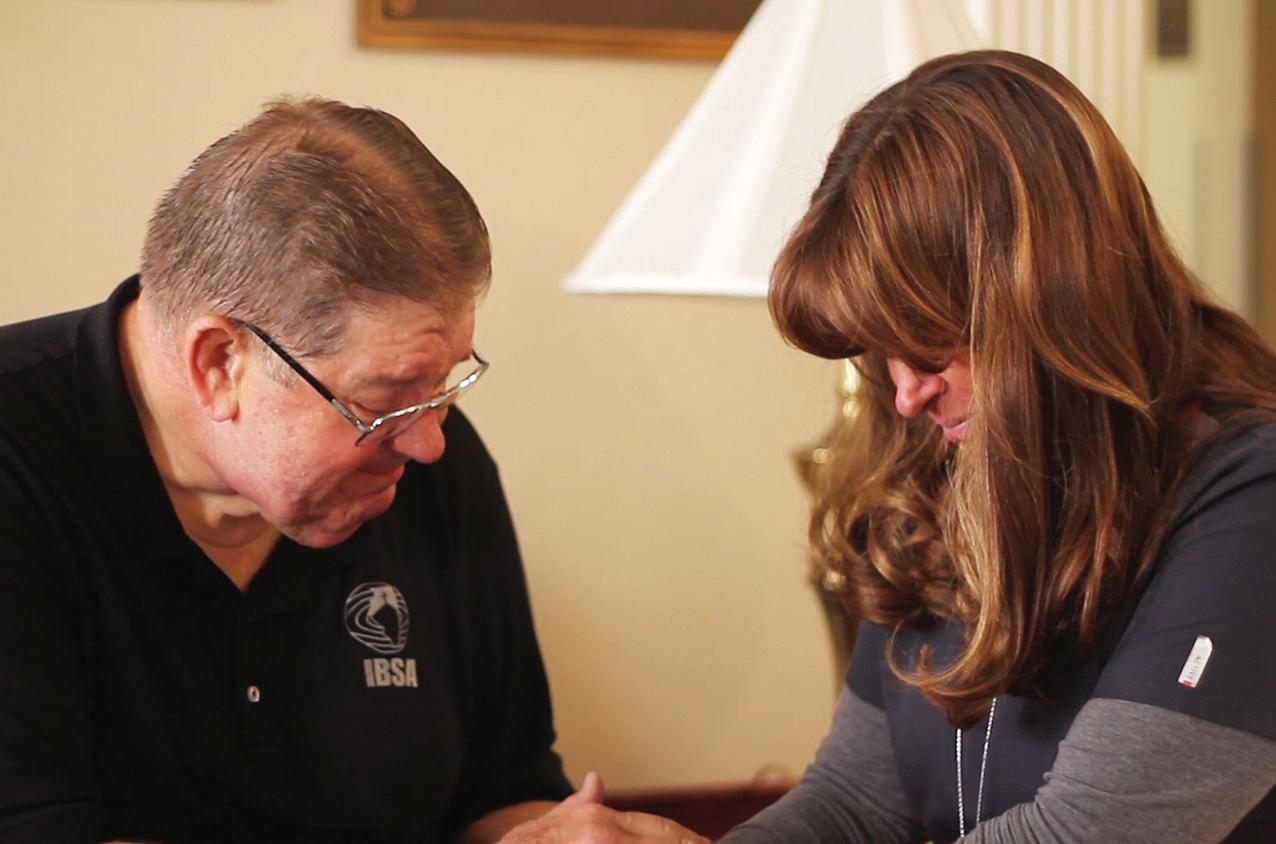
ly, to begin praying for one person in 2019. As they pray for that person, we believe the Lord will begin to touch their heart to witness to them. We believe God will open an opportunity to share their testimony and a gospel conversation, allowing them to present the gospel sometime in 2019.”
He has used the phrase “each one reach one” to describe a one-by-one strategy to reach people with the gospel. “Who’s Your One?” is built on the same idea. There are more than 8 million people in Illinois who haven’t trusted Christ, Pajak said. It’s an overwhelming number, but strategies like “Who’s Your One?” could have a huge impact.
“There are 114,359 resident members in IBSA churches in Illinois,” Pajak said. “Can you imagine the impact we could have on our state if each active church member began praying daily for a relative, friend, neighbor, or coworker, and then looked for an opportunity to share the truth about the death, burial, and resurrection of our Savior?”

For more information about evangelism training, resources, and this year’s “Who’s Your One?” emphasis, contact Pajak at (217) 391-3129 or PatPajak@IBSA.org.
Southern Baptists are mourning two men who each led the Southern Baptist Convention during a pivotal time in its history.
Evangelist Bailey Smith, who helped sustain the denomination’s return to conservative theology (known as the Conservative Resurgence) at its outset, died Jan. 14 at home in Georgia. He was 79.
Smith’s election as SBC president in 1980 was the second victory for conservatives following the landmark election of the late Memphis pastor Adrian Rogers in 1979.

Smith was pastor of First Southern Baptist Church in Del City, Okla., when he was elected SBC president. He followed a call to vocational evangelism in 1985, conducting area-wide crusades, church revivals, and overseas ministries. First Baptist Church in Woodstock, Ga., led by Pastor Johnny Hunt, hosted one of Smith’s conferences.
SMITH in 2001
“I believe that time will tell that there has been no man alive any more passionate about winning souls for Christ than Dr. Bailey Smith,” Hunt said.
Six days prior to Smith’s death, fellow former president Jimmy Allen died in Georgia at age 91. Allen, the denomination’s last moderate president, was known for his gregarious personality and engagement with cultural issues.
Allen was a confidant of President Jimmy Carter and once met with Ayatollah Khomeini on Carter’s behalf during the Iran hostage crisis. A hallmark of his SBC presidency was Bold Mission Thrust, a campaign adopted in 1978 “to enable every person in the world to have the opportunity to hear and to respond to the gospel of Christ by the year 2000.”
ALLEN in 1979
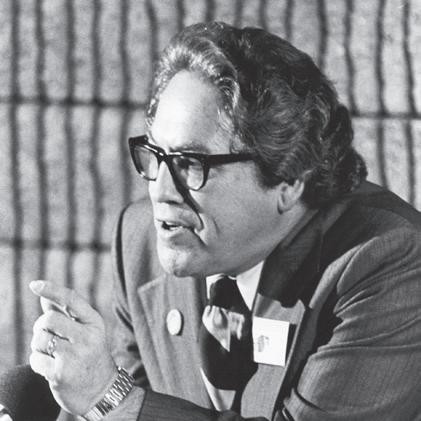
He led the SBC’s Radio and Television Commission from 1980-90 and the Baptist General Convention of Texas’ Christian Life Commission from 1960-68.
While SBC conservatives and moderates alike came to applaud Allen’s thinking on race, biographer Larry McSwain told Baptist Press, his “progressivism” in other areas like theology and U.S. politics “probably triggered some reaction” from Southern Baptists involved in the Conservative Resurgence.
Among Allen’s deepest personal struggles were the deaths of several close family members stemming from AIDS. He detailed the experience in the 1995 book “Burden of a Secret” and became an advocate for AIDS patients.
– From Baptist Press reports





People who don’t feel they are male or female can now identify as Gender X in seven states and two major U.S. cities. New York City and California just joined the list of places where a person can claim a “non-binary” sexual identification. New Jersey and Vermont will add “X” to their official choices later in 2019. NYC Mayor Bill de Blasio tweeted:
“To all trans and non-binary New Yorkers: We see you, hear you and respect you,” as he announced residents can change their gender on their birth certificate to M, F, or X—without a doctor’s note. Arkansas was the first state to offer the option in 2010, with a small clause tucked in a little-known statute. Colorado, Maine, Minnesota, Oregon, Washington State, and Washington, D.C. have since allowed “X” on legal documents, along with 10 countries outside the U.S.
Two groups of evangelicals are coming under criticism for encouraging inclusion of sexual orientation and gender identification under federal Civil Rights protections. The National Association of Evangelicals (NAE) and the Council for Christian Colleges and Universities (CCCU) supported proposed legislation. Now a pastors group which battled the issue in Houston is calling the action by NAE and CCCU “the great evangelical sellout.” In Houston, a lesbian mayor had sought to file suit against pastors who preached against protecting homosexuals in Civil Rights statutes. In the more recent action, the NAE and CCCU said, “No one should face violence, harassment, or unjust discrimination” as reasons for their public, but controversial support.
The House of Bishops in the Church of England has approved a celebration service for people switching sexes, a move criticized by conservative members of their own denomination. Some leaders in the broader Anglican Communion (which includes U.S. churches) say the new service is an adulteration of baptism and an affront to a biblical understanding of sex as God-ordained and permanent. Some clergy have asked for a conscience clause allowing dissenting priests to refuse to perform the service which recognizes a new name and gender as part of church membership of a “transitioning” person. Archbishop Ian Paul asked, “What would it say for the church to ‘celebrate’ gender-identity change to the spouse who feels betrayed, to the children who feel abandoned, to the parent who feels bereaved— and even to those who have undergone transition and now regret the decision?”
– Baptist Press, The Christian Post, Baptist Press Get breaking news in The Briefing online, posted every Tuesday at www.ib2news.org.
Amsterdam | Christian leaders in the Netherlands who signed a statement on biblical sexuality have been threatened with criminal prosecution, admonished by employers, and derided by protests. The episode has been cited by Southern Baptist Theological Seminary President Al Mohler Jr. as “an ominous warning” of religious liberty restrictions to come in the U.S.
About 250 theologians and leaders signed a Dutch translation of The Nashville Statement, a 2017 U.S. document that upholds the biblical prohibitions of homosexual practice and transgenderism. The original statement was released by an evangelical coalition including the Council on Biblical Manhood and Womanhood and the SBC’s Ethics & Religious Liberty Commission.
The Dutch government’s prosecution service announced last week it was examining the statement to see if criminal prosecution of signatories was warranted, Dutch News reported. Dutch opera singer Francis van Broekhuizen has filed a formal police complaint against a Dutch member of parliament who signed The Nashville Statement.
Meanwhile, a professor at the Free University of Amsterdam has been admonished for
signing the statement, then stating churches must not be silent about the threat of transgender ideology like they were about the threat of Nazi ideology before World War II. “There are many in the United States who would say, ‘Well, that’s the Netherlands. It can’t have anything to do with Christians in the United States,’” Mohler said in his Jan. 9 podcast. “But, of course it can.
“Remember that back in 2001, when in the Netherlands same-sex marriage was legalized, even many who later became avid proponents of same-sex marriage, said in 2001, ‘It can’t happen here,’” Mohler said. “But it did happen here.... Consider that an ominous warning as you consider this headline news story from the Netherlands.”
The Netherlands, Mohler said, “demonstrates the trajectory of European secularization perhaps better than any other single nation.” Its 2001 legalization of same-sex marriage marked the first such nationwide legalization in the world. A 2015 survey indicated atheists outnumber theists among the Dutch, and 59% of Netherlands residents said they had never entered a church building.
– Baptist PressThe movement to ban conversion therapy as a treatment for people with same-sex attraction is growing momentum, according to a report in World magazine. Currently 14 states and the District of Columbia have laws on the books forbidding the treatment. And pro-LGBT advocates are pushing for legislative victories in Colorado, Maine, Massachusetts, and New York in 2019. In early January, the City of Denver passed a similar statute.
The proposed laws would prohibit therapy sessions involving straightforward talk from Christian counselors. Those counselors say prohibiting Bible-based therapy muzzles the free speech of practitioners and denies parents and children access to the treatment of their choice.
The movement against therapists who hold biblical views of sexuality and gender also appears to ignore a growing population of Americans who openly regret engaging in transgenderism.
Former transgender activist Walt Heyer, 78, had sex-change surgery in 1983 and lived as a woman for eight years before he became a Christian and accepted his biological sex. He released “Trans Life Survivors” in October, a book of stories from dozens of individuals who regret their decision to undergo sexchange surgery. The book tells 30 stories, but Heyer said hundreds contacted him and said they wished they hadn’t identified as transgender.

“I present this representative group of gutwrenching personal testimonials to put the transgender advocates on notice: We survivors know there is deep trouble in Trans La La Land,” Heyer wrote.
Heyer argues that a childhood event— sexual abuse or being cross-dressed by an adult—often precedes gender dysphoria, which sometimes co-exists with other mental conditions. He contends doctors should slow down and first search for the underlying issues before recommending hormone therapy and surgical procedures. When patients realize a transgender life does not bring the hoped-for relief, the same system of doctors “abandons them to their pain,” Heyer said.
Heyer will be one of four speakers at a conference on biblical response to transgenderism sponsored by the Illinois Family Institute. The 5 ½ hour conference will be held March 16 at Stone Church in the Chicago suburb of Orland Park.
– Baptist Press, with additional info from Illinois Baptist

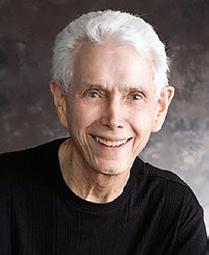

Chicagoland | Every January for the past five years, the Chicago Metro Baptist Association has hosted a prayer conference for churches in the region. This year, however, instead of a conference, CMBA will commemorate the day of prayer on a bus tour through Chicagoland.

“I wanted to celebrate our fifth year as a milestone,” said Cheryl Dorsey, prayer coordinator for CMBA. “And a bus tour is a good way to see the neighborhoods we’ll be praying for.”
The bus tour, scheduled for Saturday, Jan. 26, will focus on praying over the Chicagoland mission field. The group will travel through various neighborhoods with stops at five churches: Hillcrest Baptist Church, Faith Tabernacle, Advent Church, Chicagoland Community Church, and Iglesia Bautista Erie.

CMBA pastors will share their prayer concerns for their churches and communities, and facilitators Dorsey and Phil Miglioratti will lead

the tour as they “pray onsite and en route,” for those concerns.
“As we travel between each church, we will review the social and spiritual profile of the neighborhoods, praying en route for those communities,” Dorsey said. The heart of the prayer tour is to cover leaders in the region with prayer.
“Chicago is hard ground,” Dorsey said. “I was hearing of all this terrible persecution going on in the churches and the difficulties of pastors.” She felt a sense of righteous indignation, Dorsey added, and felt moved to lead people in Chicagoland to pray for the shepherds God has placed in the city.
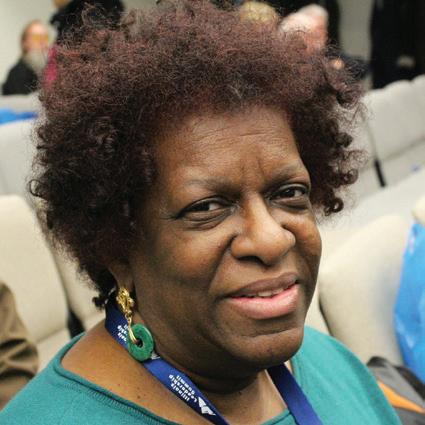
The day of prayer will begin at 8 a.m. at Hillcrest Baptist in Country Club Hills and conclude there at 4:30 p.m. IBSA is partnering with the Chicago Association to provide the bus for the day.
“There are 50 seats on the bus and many spots are still available,” Dorsey said. “We welcome all to join who are
able, regardless if you’re a leader in a church or not.”
Dorsey added that even those who can’t take the tour can still be part of the day of prayer. She encouraged those who aren’t able to attend the entire tour to meet the bus at one of the five locations nearest them. “More prayer, more power,” she said.
“Please invite your congregations to come and participate in your location.
We want to maximize the prayers being launched for the Kingdom in Chicagoland.”
Registration is free and only required for those riding the bus. For more information or to sign up for the prayer tour, contact the CMBA office at (773) 278-4400 or e-mail Cheryl Dorsey at Pray@ChicagoBaptist.com.
Nashville | LifeWay Christian Resources, which operates 174 stores in the U.S., announced Jan. 15 that it will close locations, although the e-mail to the organization’s employees did not say how many.
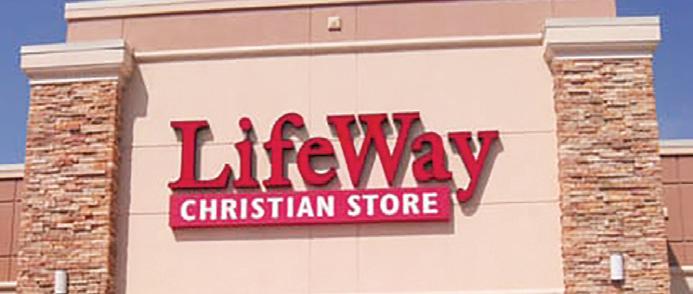
The stores lost $35.5 million dollars in 2017, while the rest of the Southern Baptist publishing house’s product line produced $452 million, an increase of $45 million since 2009.
“…We not only continue to see an erosion in the brick-and-mortar channel, we have seen an accelerated rate of erosion in recent months,” LifeWay president Thom Rainer wrote to staff. He pledged to replace physical
locations with online resources. The number of stores and timing of the closures was not announced.
One location remains in Illinois at present, in Carterville. The Wheaton store closed after about six years in operation. The store on the campus of Moody Bible Institute will close before the fall semester, according to an announcement last week.
– IB staff, with info from LifeWay and Baptist Press
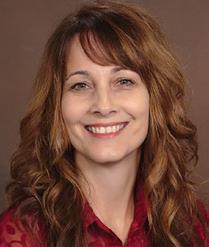
Gov. J.B. Pritzker and his family take the stage in Springfield before his swearing-in Jan. 14. Many of Pritzker’s views are at odds with conservatives, but some cultural analysts say that shouldn’t stop Christians from speaking truth—graciously—in the political realm.

Springfield | Under the towering stained glass windows of Abraham Lincoln’s church on Jan. 14, a new slate of Illinois lawmakers bowed their heads as spiritual leaders prayed over them. The picture— prayer as the starting point for public service—was a clear, powerful way to start inauguration day for Gov. J.B. Pritzker and the state’s other elected officials.
What comes next, though, is a little murkier, especially for conservatives and Christians.
Pritzker campaigned on several issues where his views run counter to those of most conservative voters. He supported the bill that legalized taxpayer-funded abortions in Illinois, and as governor, plans to legalize recreational marijuana use in the state (see sidebar on page 7).
All six of Illinois’ newly inaugurated constitutional officers ran as Democrats, and the Democratic party holds supermajorities in both houses of the General Assembly. People on the other side of the aisle may feel conservative values have been sidelined. But some Christians say now is the time to engage, despite the state’s lopsided legislative picture.

“We can become advisers to our lawmakers,” said David Smith, executive director of conservative non-profit Illinois Family Institute. Like Daniel in the Old Testament and Apostle Paul in the New, Christians can befriend and inform government leaders who hold views radically different from their own. The key, say Smith and other analysts, is playing the long game.
A higher calling
Gov. Pritzker’s inauguration day prayer service at Springfield’s First Presbyterian Church included readings from the Bible and the Quran. A Chicago rabbi prayed over Pritkzer, and faith leaders from other traditions prayed over his fellow elected officials. Conservative evangelicals weren’t noticeably represented at the service, which emphasized justice and mercy as qualities required from effective leaders.
Pritzker has highlighted those qualities when discussing his own Jewish upbringing. He and his wife, M.K., who converted to Judaism before their marriage, are raising their two children in the tradition of Pritzker’s parents—one in which values such as
social and economic justice meld seamlessly with what one would hear in the synagogue, Pritzker told the Chicago Sun-Times during his campaign last summer.
“The job of governor, which is standing up for people, particularly our most vulnerable…that feels very natural to me,” Pritzker said on the paper’s “Face to Faith” podcast. “A governor who is not thinking about those who most need help and those who are striving to achieve, is a governor who’s failing.”
Advocacy for the disenfranchised could serve as a point of connection between the new governor and Christians. But there are other barriers, primarily as conservatives disagree with many of Pritzker’s positions. And conservatives and Christians have faced a rocky few years. Former governor Bruce Rauner, a Republican, was locked in a long budgetary struggle with Democratic leadership, and also turned off many conservatives with his eventual support for House Bill 40, which legalized taxpayer-funded abortions in Illinois.
Although he had promised to veto the controversial bill, Rauner signed it in 2017, a move that eventually resulted in fellow Republican Jeanne Ives running against Rauner in the party’s primary election. The governor won a narrow victory, but lost by 16 points to Pritzker in November.
Conservatives wary of the Democratic majorities might concede that the only logical choice is to disengage, at least for four years. But political victory can’t be a Christian’s ultimate goal, Southeastern Seminary’s Bruce Ashford told the Illinois Baptist

“Our public political discourse and political action on behalf of pro-life, religious liberty, and other causes—we do this out of our witness for Christ. Not just to win,” said Ashford, a professor of theology and culture at the Wake Forest, N.C., seminary.
Ashford’s 2018 book, “Letters to an American Christian,” offers a look at some of society’s most difficult issues, and its theme of truthful, gracious political engagement can be a guiding principle for Christians who feel outnumbered or underrepresented.
“We do what we do out of witness and obedience,” Ashford said. Otherwise, he added, we’re “sacrificing Christianity on the altar of short-term activism.”
In Pastor Mark Minor’s southern Illinois community, the politics of Chicago feel “ubiquitous and overwhelming.” His region is more conservative, but there’s also a resignation that nothing will change as long as deeply entrenched leaders and loyalties remain in power.
The pastor of Whittington Church challenged a more experienced politician when he ran for state representative in 2012. During his campaign, some people asked, “What’s a pastor doing getting involved in politics?” Minor said. But the current state of affairs is such that Christians have to engage.
“It’s not about Pritzker or Rauner or whoever the next governor is, it’s about positions. That’s the key,” Minor said. Many people in his church have chosen to engage at the local level, on school boards or as county officials.
Engagement can be as simple as a visit to your local representative, Smith said. He encourages Christian voters to visit their state representatives and senators, either in their district offices or in Springfield. And go in groups. A small group from one district is more likely to get a hearing, Smith advised, since lawmakers have limited time to meet with constituents.
Let the representative know you’re praying for them and ask how you can help them, Smith said. Share your concerns, but graciously. “You want to be able to present a winsome case with the goal of fostering a relationship,” Smith said. Relationship leads to the gospel. It’s the long game, and the ultimate goal.
That goal is why our discourse has to be governed by both truth and grace, said Ashford. Starting with social media, a Christian’s political engagement ought to be infused with the truth of Scripture, and the grace of Jesus Christ. It’s hard to do when we feel mocked or misrepresented by the other side, Ashford acknowledged, “but the problem is that we often respond in kind.”
“We as Christians sometimes think that we can lay our Christianity aside when it comes to the political arena. This is bad biblical reasoning.” Rather, he said, Christians are positioned to “speak a good word in a bad moment.”
Gov. Pritzker’s inauguration ceremony ended with a performance by Miguel Cervantes, a Chicago musician currently starring in “Hamilton.” From the end of the stage, he issued a warning, and a charge, that characters in the musical give each other: “History has its eyes on you.”
It was a moment meant for Pritzker and the other leaders sworn into service that day. But it could double as a word for Christians facing an uphill battle to play the politics game with truth and grace.
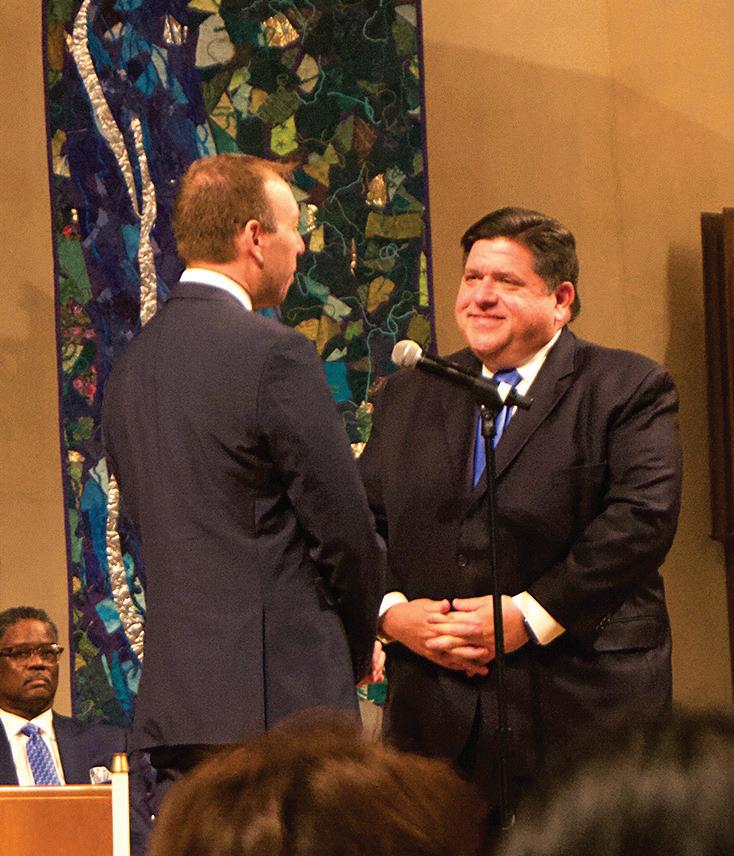
Where evangelicals and the Pritzker administration may disagree
During his campaign, Gov. J.B. Pritzker was clear about his intention to legalize recreational marijuana in Illinois. In his inauguration day address in Springfield, Pritzker pledged to “work with the legislature to legalize, tax, and regulate the sale of recreational cannabis in Illinois,” pointing to increased public safety and economic inclusion as reasons for the move.
But David Smith of the Illinois Family Institute is concerned that most Illinoisans are unaware about what the administration would actually be legalizing—high-potency marijuana that is different from what was available in the 1970s and 80s. Smith called on Christians to speak out against the measure, pointing to the warning in 1 Peter 5:8 to be alert and soberminded.
“If we don’t raise our voice collectively and say this is a bad idea [and] it’s going to create a lot more victims, then (the legislation) is going to go through,” Smith said.
Pro-life advocates are watching for how the Pritzker administration could seek to expand abortion access in Illinois. As a candidate, he championed pro-choice causes, including the legislation that legalized taxpayer-funded abortions in Illinois. His campaign website highlights his position that “all women should be able to access reproductive healthcare in Illinois regardless of their income.” He has also pledged to oppose funding cuts for Planned Parenthood.
Last year, lawmakers introduced legislation that would require every public elementary and high school “to include in its curriculum a unit of instruction studying the significant role of lesbian, gay, bisexual, and transgender individuals in society.”
The Illinois Senate approved the measure last spring, but the House didn’t act on it. Concerned parents and conservatives will continue to monitor the issue, which lawmakers could take up again in the new session.

Like a growing number of churches, The Summit Church in Raleigh, N.C., cancelled services the Sunday after Christmas. Pastor J.D. Greear took some heat on social media for the decision, but should he? What’s wrong with skipping a lightly attended service and giving everyone a break after the holidays? What about the growing practice of occasionally cancelling a Sunday service in order to send the people into the community for outreach projects? Should we ever cancel “church”?
In order to answer the question, there are at least two prior questions we must settle in our minds:
First, is a weekly gathering on Sunday commanded by God? Regular Sunday services are a firmly established part of the Christian tradition. There is strong historical warrant for gathering on Sundays, but is it a biblical requirement?



The answer to that question depends largely on whether we believe the Old Testament commandment about Sabbath-keeping teaches an inherent seven-day rhythm to time and the setting aside of one day in seven for special use. Some Christians will point out that the fourth command-
ment is the only one that is not explicitly repeated in the New Testament. Others will argue that it was never explicitly annulled.
It is clear that Christians are commanded not to forsake assembling together (Heb. 10:25). And there is an assumption throughout the New Testament that believers come together for meetings (see 1 Cor. 11, 14; James 2:2). But where did we get the idea that this expectation applies to every Sunday at the very least?
Well, Christ rose from the dead on the first day of the week and met with his gathered disciples that evening (John 20:19) and again on the next Sunday (John 20:26). In Acts 20 we read that Paul was in Troas for seven days and it was on the first day of the week that the believers all gathered
together. 1 Corinthians 16:1-2 says to collect an offering “on the first day of every week.” Are these examples prescriptive, or merely descriptive? That’s an interpretative decision. Wherever we land, we must at least admit that the case for first day observance cannot be easily dismissed.
The second question we must consider is this: What is the purpose of the Sunday gathering?

We’ve all probably wrestled at some point with whether Sundays are for the saints to be edified or outsiders to be evangelized. I think we must answer, “Both!” Paul envisioned unbelievers having an encounter with God after walking in on Christians worshiping and ministering to each other (1 Cor. 14:23-25).

Even more fundamentally, however, we must reckon with the very essence of what it means to be the
church. Most scholars agree that the word “church” (ekklesia) means “assembly.” This would imply that when the church assembles it is being most true to its identity.
So is gathering together simply one (among many) practical means of achieving edification and/or evangelization? Or is holding a public meeting a declaration of what it means to be the church, sinners reconciled to God and each other through the blood of Christ? These are important questions church leaders must resolve in their minds before calling off a corporate gathering.
My conviction is that there is something sacred to Sundays, not as a legalistic box to check to be right with God, but as a time for the church to gather as the people of God and be regularly reminded of what indeed makes us righteous and what alone has the power to save—the work of Christ. If workers need a break, find temporary replacements or schedule a simpler service. Cancel Christmas Eve, but stick with Sundays. And if only two or three show up, his presence is still among us.
Nathan Carter pastors Immanuel Baptist Church in Chicago.



I’m a Millennial. And while I didn’t grow up in the States, my family visited numerous churches across North America during our furloughs from the mission field. I personally didn’t grow up in any of those churches, but I couldn’t help but notice a curious disconnect between young people and church leaders.
For years, my generation has dominated headlines and sounded alarm bells for the church. We children of the internet age were difficult to reach (and pin down) because of the vast amount of constant information available to us. Often, we felt our needs went unmet and questioned the traditions of the church. We left organized religion in large numbers, comprising a large percentage of the “nones,” those unaffiliated with any faith group.
Nevertheless, there are many of us still in the pews—and ready to lead. And through our experience growing up in both the church and the present fast-paced culture, here are five traits I think Millennials have developed that uniquely position them to benefit the church:
1. Authenticity. Some of the distance I’ve noticed between young people and leaders is just that—distance. In the past, some church leaders have felt driven to present only positive aspects of their lives and their families. But most Millennials aren’t looking for this type of leader. Rather, they feel validated by a leader’s vulnerability and openness. A Millennial church leader is relatable, approachable, and open to personal, redemptive discussions.
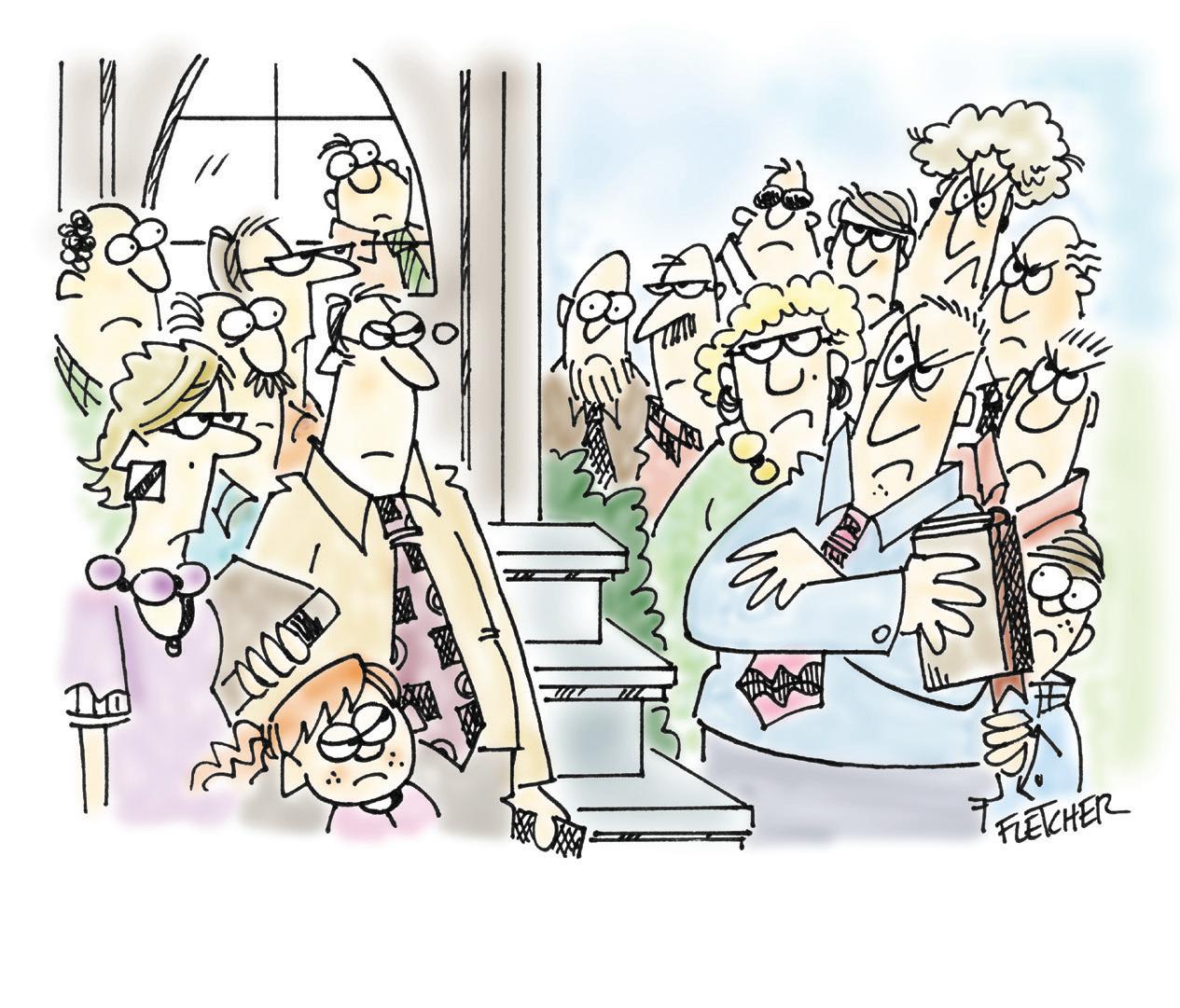
2. Awareness. As a missionary kid transitioning to the States, it was a challenge for me to find where I belonged in American society, or even to find a leader or group in the church that met my needs. Like every generation, Millennials deal with real-life issues. What many haven’t experienced is a church open to talking about the racial discrimination they face, or the mental health struggles that mark their days. They value awareness in the church, as well as receptivity and the sense that their voice will be heard,
even on difficult topics. Millennial leaders are well-equipped to reach people who aren’t like them, and to help prevent a cliquish atmosphere that excludes some would-be worshipers.
3. Relationships. Trying to find a church is always difficult. Doing so in my college years away from family and friends was even more trying. Like most Millennials, I was seeking real relationships with people I attended church with and the leaders I found there.
We want someone to walk beside us through the muck of everyday life. Millennial leaders understand the need to not only preach, but also to teach, mentor, and lead others.
4. Ambition. Through my discussions with various friends, it’s evident many Millennials growing up in the church feel their churches rarely addressed social and controversial issues. As a generation, we want to be active and involved in the mission
statement of our church, instead of just talking about it. Millennial leaders want to solve problems and get to the heart of the gospel. They want to make a difference in the community, so the church’s impact is felt by people outside the walls.
5. Practical instructions. Millennials have grown up hearing about the sinfulness of their culture. This can become tiresome and at times, feel pointed. Instead of hearing about the culture’s perpetual sin, Millennials want to hear how the Bible transcends the wickedness of modern culture, toward the gospel-infused transformation of it. Millennial leaders are compelled not simply to preach toward an emotional response; they want to instruct the people they lead how to truly live out the gospel.
Millennials are excited to lead in a way that God has equipped them. But as is often the case with each generation, they can benefit from established leaders who are willing to help. Invest in their lives, be aware of their insecurities, build relationships with them, find their ambition, and teach them how to use it for a godly purpose in a biblical context.
They, in turn, can do the same for others and become significant leaders in your church.
Born in the ‘90s, Andrew Woodrow grew up overseas with his family in Africa. He and his wife, Jennifer, live in Springfield where Andrew is IBSA’s multimedia journalist. They are active at Delta Church.

Read: Matthew 22:37, ESV
“And he said to him, ‘You shall love the Lord your God with all your heart and with all your soul and with all your mind.’”
In every kitchen there are appliances: toaster, refrigerator, stove, microwave, can opener, etc. Each appliance was designed by its manufacturer for a specific purpose. Each one has its own unique reason for being.

Now you can use your appliances any way you want, but if you use them outside of their purpose, they won’t be as effective and someone may get hurt. You can try to cook in your refrigerator, or freeze things in your microwave, or open a can with your stove, but that’s not what any of them were designed to do. Appliances don’t tell the manufacturer what to do, they do what they were created for.
In the same way, we are God’s creation. God tells us why we exist and he tells us what we are designed to do. God created us to worship him; that is our purpose. And if we operate outside our purpose, we will experience frustration and confusion. But, when we fulfill our purpose, we find fulfillment and joy, because we discover what God created us for.
So, we start the year on purpose. Worship God with all you have and ask him during your worship time to reveal your purpose, why he created you. And when he answers, pursue his purpose and enjoy the journey.
Prayer Prompt: Father God, you created us on purpose and for a purpose; none of us were an accident or a mistake. Father, reveal your purpose for each of us as we worship you and seek your face, that we may live out your purposes for your glory.
Adron Robinson is pastor of Hillcrest Baptist Church in Country Club Hills and president of the Illinois Baptist State Association.
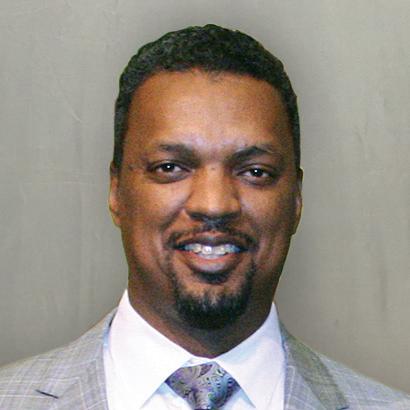
your investment in our generation matters
QMy daughter’s church is doing creative and effective children’s ministry, while our church is doing the same old thing with the same old results. No one here will even consider change. How can I get them to explore the options, without either taking over the kids’ program (which I do not want to do) or making people mad?
AThis may be a perfect time to offer “required” cutting-edge training for children’s ministry workers. Enlist an effective children’s ministry leader from outside your church to introduce some innovations that can be implemented in small increments. The changes don’t have to happen all at once. After they hear the fresh ideas, encourage your children’s director and workers to set goals, put strategies into place, and make plans on how and when to start working the new ideas into the ministry.
QWe got more than 300 applications for our vacant pastor position through an online service. There were barely a handful that might have been a match for our church, and ultimately none worked out. Before we start round two, is there a better way to search for a pastor?
AThe Southern Baptist Convention has six seminaries and thousands of trained men looking for the Lord to open a place of service. Contact the schools (go to sbc.net to find their info) and let them know about your leadership vacancy. IBSA’s Church Resources Team has also created a manual to aid your church’s search process. Email AubreyKrol@IBSA.org for more information.
Throughout the process, make sure the search team has clearly defined the expectations for your pastoral candidate. Draft a copy of questions you would like answered and sent back prior to inviting him for an interview. Be patient. It’s important to remember that God has the perfect person to meet your need. Wait on the Lord!
Pat Pajak is IBSA’s associate executive director for evangelism. Send questions for Pat to IllinoisBaptist@IBSA.org.
Bobby Barnhill’s church celebrated his 50 years of service at a surprise party
Nov. 3—five decades after Barnhill’s first sermon at McArthur Drive Baptist Church in North Pekin. Barnhill, a military veteran, is a graduate of Western Illinois University and Trinity Theological Seminary. His father, Virley Barnhill, was also a long-time IBSA pastor, leading Elmridge Missionary Baptist Church in East Peoria for more than 30 years.
Visitors to Streator Baptist Camp might be surprised by a new building at IBSA’s camp facility in northern Illinois. The new building actually isn’t new, but it has been completely renovated with help from several volunteer teams from IBSA churches.

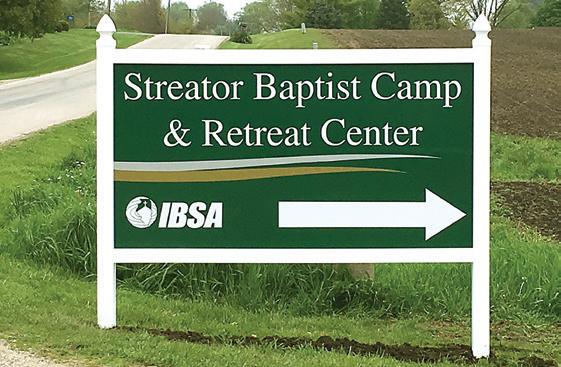

Previously used as a camp office and laundry room, the building had fallen into such disrepair that it was no longer usable, said Mike Young, who manages Streator Camp. But teams from FBC Columbia, FBC Waterloo, Meadowridge Baptist in Zion, and Illinois Campers on Mission gutted the building and replaced everything from floor joists to the roof.
“The building is now set up like an apartment,” Young said. “It has a full kitchen, a sitting area, two bedrooms, and a full bath.”
Young plans to use the renovated building for camp interns this summer, and for families on retreat and other events the rest of the year. For more information, go to IBSA. org/Streator or contact Young at MikeYoung@IBSA.org or (815) 672-0084.
Along with pastoring, Bobby Barnhill also worked for Komatsu in Peoria for 33 years. The pastor and his wife, Carolyn, have three children and three grandchildren.

As the Illinois Baptist celebrated the long tenures of IBSA pastors last year, others were brought to our attention, including Pastor Edmund Hill, who marked 55 years at Bayle City Baptist Church in Nokomis in 2018. We’re thankful for you all!

Geraldine Hendricks, the wife of a long-time IBSA pastor, died December 12 in Corpus Christi, Texas, two weeks after the death of her husband, George. The couple served Main Street Baptist Church in Braidwood for 54 years until George’s retirement in 2011. Geraldine, known as Jerry, played piano at the church and also taught high school art and English. She is survived by her six children and 17 grandchildren and great-grandchildren.
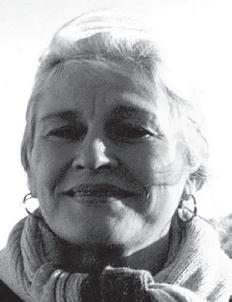
KBC Executive Director-Treasurer
The Kentucky Baptist Convention Search Committee is accepting resumés through Feb. 15, 2019, for the position of Executive DirectorTreasurer to work with the 2,400 churches in the Convention.
Find more ministry positions at IBSA.org/connect Send NetworkiNg items to IllinoisBaptist@IBSA.org
First Baptist Church, Carterville seeks a part-time worship leader to work 15-20 hours per week. Interested applicants should contact Charity Lantagne at (618) 731-0445 or charity.r.jones@gmail.com.
Baptist Children’s Home and Family Services is currently seeking individuals for several roles, including counseling therapist, recreation specialist, licensed mental health therapist, houseparent, and campus coordinator. For more information, go to BCHFS.com/employment.
Education requirements: Required Master’s of Divinity Degree, or equivalent, from accredited institutions. Doctorate Degree preferred.
Skills required: Applicants must possess obvious call of God to ministry; have excellent oral and written communication skills, including proven ability in the pulpit; be enthusiastic supporter of the Cooperative Program; proven visionary leadership skills; strong personal relational skills to work with persons representing diversity in Baptist life.
E-mail resumés to kbcexecutivesearch@gmail.com
January 1-31
Resources: SBC.net/inallthingspray
January 22-23
VBS Clinics
Feb. 23: FBC Carterville
March 2: Chatham Baptist
March 16: FBC Woodlawn
March 30: Northside, Dixon
April 6: Broadview Missionary
What: Training, ideas, and inspiration for 2019 Vacation Bible School Info: IBSA.org/kids
February 28
iConnect: IBSA/Pastors
Meet-Up
QI’m almost debt-free, and I’ll be finishing my master’s degree soon. I’m not from this country, so I’ll be returning home in the next three to five years. Considering my situation, would investing in the stock market be a good idea? I’ve been reading that the market is about to crash, so I wanted to get your advice before doing anything.
What: The premier mid-winter gathering for Illinois Baptist leaders from every region; leaders will learn with and from one another how to expand their leadership skills, and use them to help grow effective churches in our unique context

Where: IBSA Building, Springfield Register: AubreyKrol@IBSA.org
January 24
What: Valuable tax info for current and retired ministers, treasurers, and other church leaders
Where: Second Baptist, Marion Info: LindaDarden@IBSA.org
February 2
What: View a rebroadcast of this year’s men’s conference at one of multiple locations
Where: Northside, Dixon; Calvary, Monticello; Woodland, Peoria; Living Faith, Sherman; Bethel, Vandalia; West Side Missionary, Mt. Vernon; Second, Marion; Collinsville Community

Cost: General registration of $25 ends Jan. 25; late registration is $30 Info: IBSA.org/men
February 16
What: Learn how to use worship technology to unite believers in corporate worship. This year’s focus is on sound, worship leading resources, video projection, Ableton, Loop Community, social media, and more.
Where: IBSA Building, Springfield
Cost: $15 per person, includes lunch Info: IBSA.org/worship
February 22
Leading on Empty
What: Time of reflection and refueling for pastors
Where: IBSA Building, Springfield Info: LindaDarden@IBSA.org
What: Introduction to IBSA staff, ministries, training, and opportunities, for pastors and church staff members
Where: IBSA Building, Springfield Info: AubreyKrol@IBSA.org
March 2
Worship Leaders Skill Development Workshop
What: Skill training for worship leaders, keyboardist, guitarists, and vocalists
Where: Bethel, Bourbonnais; 8 a.m. –12:30 p.m. Register: IBSA.org/worship

March 3-10
Annie Armstrong Easter Offering and Week of Prayer for North American
Missions
Resources: AnnieArmstrong.com
March 11-12
Preach 2019
What: Teaching for pastors and church leaders from Pastors Fred Luter, Eddie Bumpers, and more
Where: Meadow Heights, Collinsville Register: preachconference.com
March 14-15
Crisis Intervention and Stress Management Training
What: Training for chaplains in how to provide effective spiritual and psychological care in times of loss, disaster, emergency, trauma, and crisis

Where: IBSA Building, Springfield Register: IBSA.org/CISM
AIf someone could accurately predict the stock market with certainty, that person would be a multi-bazillionaire. Right now, there are also articles out there that say the market is about to boom. There are always “glass half-full” and “glass half-empty” articles floating around. I wouldn’t avoid stock market investing based on one ridiculous article you read.
However, in your situation you may not want to invest in the stock market right now. History says you stand a fair chance of coming out with less than you put in if you don’t leave the money invested in the stock market alone for at least five years. The market cycles up, and the market cycles down. This really isn’t a big problem if you’re going to put your money in there, and leave it alone for 20 years or more. But three to five years? The historical data says you’ve got a reasonable chance of actually losing money.
So, I probably wouldn’t invest if you’re going to be gone in five years or less. Instead, when you’re settled and have a career in your home country, I’d advise looking into how you can invest there. You might even want to do some research, and find out if you can begin investing there now.
QI’m debt-free except for my home, and I have a small business with revenues of around $100,000 annually. About half of that is profit, and I typically pay myself 40% of the bi-weekly revenue. I’m in the media business, and I need to upgrade some equipment. At what point do I put back a little more money, or pay myself a little less, to make this happen?
AI know what you mean. We’re in the media business too, and around my office it seems like we buy more and newer technology every day. Really, it’s like a black hole. You could throw money into it the rest of your life, because practically the very moment you open the box it’s obsolete. We finally decided to designate a percentage of our revenues to equipment replacement. Something is always being replaced, but this way we’ve got a limit and we’ve got something set aside to make our technology needs happen. It’s like the envelope system. If the envelope’s empty, we have to stop buying and put off whatever it is until the cash is available again.
I hope this helps!
Financial advisor Dave Ramsey is a prolific author and radio host.

March 9
Hands-on mission projects make ministry in your community come alive.
For kids in grades 1-6
Multiple locations across the state
For more information and to register go to IBSA.org/cmd
Location: Silvis
Focus: Hispanic residents in this growing city
Characteristics: Part of the Quad Cities metro area, Silvis is a community of more than 7,600 people, including more than 1,100 Hispanics.

Prayer needs: Pray for a church planter to reach Silvis’s largely Mexican population of Hispanic residents. Pray for renewed vision for the Quad Cities, and passion to reach out to Hispanic peoples in the region.
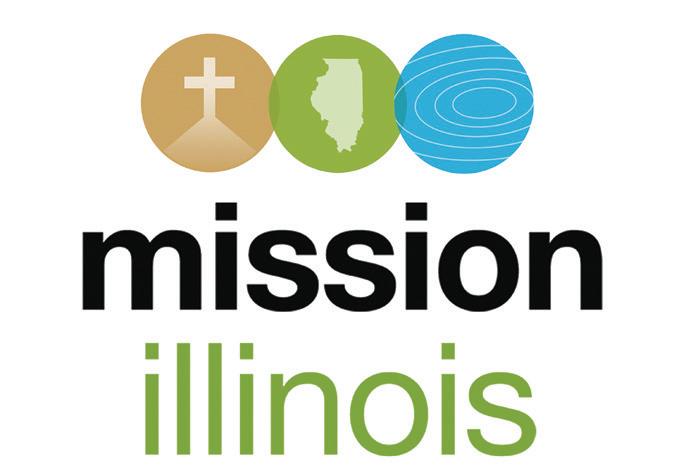 – IBSA Church Planting Team
– IBSA Church Planting Team
An Ontario, Canada church had lots of new neighbors in its growing, well-off community. And they had a problem: How could they meet the neighbors and share the gospel?
The answer: food trucks.

Now, St. George’s Church welcomes up to 500 people for their summertime Thursday night event, Breaking Bread. The pastor of the church invites a couple of venders each week, sets up hockey and basketball goals, and arranges for some church members to come meet the neighbors.
“We wanted to show our community how the generosity of the gospel changes lives,” one of the organizers said. “We welcome total strangers onto our property, invite them to share a meal and break bread with us, and entertain their kids while they sit back and relax.”
A dinner of upscale foods eaten from trucks has broken through the isolation felt by many people who are new to the neighborhood and far from home.
“The gospel cuts against isolation…with the good news of Jesus
Contrary to popular belief, Chicago’s nickname has nothing to do with the weather. The city’s “windy” status was cemented by its politicians’ reputation for being boastful and long-winded.
Christ who has freely given to us, though we didn’t earn it; inviting us into his kingdom, to his table, and into friendship with him,” said Rev. Ray David.

St. Louis ranked among cities reporting the most people who volunteer weekly, with 20% of residents serving.
So many Christians try hard but just miss the mark in using social media strategically to be a witness for Christ to their friends and followers. I’ve seen lots of well-meaning people blow it with a few of these missteps.
• No fact checking. They don’t bother to check anything before they post or re-post. Some folks just share anything that seems to fit their current emotional state.
• Complaints. Their profile page appears to be the best place to list the top five complaints of today.
• Lack of awareness. They show little consideration of how their media content represents Christ and the church. I’m surprised how much negativity can be expressed in 30 characters, such as a cheesy Christian meme in the morning, followed by an R-rated movie quote in the afternoon.
• Prayer turns to gossip. Just like on the prayer list at church, except it’s online.
• Negativity. They criticize the pastor or small group leader in what should be Sunday’s prime time post to encourage others. “Hey, I’m headed to church. Join me there!”
If we follow any of these examples, we may ruin our witness in the community. Instead, I’d like to suggest trying the exact opposite of this list, and it says in Philippians 2:4, choose to “do all things without arguing or complaining.” That includes my social media accounts!
with 16% saying they volunteer.
#41
Only one Midwest city landed in the top ten.
#2 Green Bay-Appleton, Wisconsin ranked with 28% putting their free time to good use each week.
Chicago came in at – Barna.org
Whatever we do, we should make sure that our everyday lives match what we’re posting and sharing. That requires thinking about how our online life will represent Christ. So let’s all post something encouraging today and reflect the love of Christ and a love for his church.
Autumn Wall and her husband are planting a church in Indianapolis. She is coauthor with her mother, Diana Davis, of “Across the Street and Around the World: Ideas to Spark Missional Focus” (New Hope Publishers).
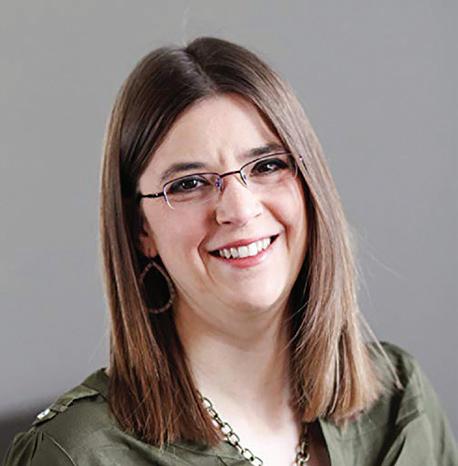
Understanding the world where we live and serveAUTUMN WALL – St. George’s, Burlington – Chicago Historical Society